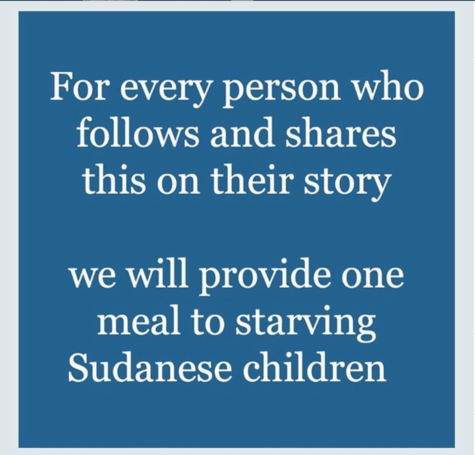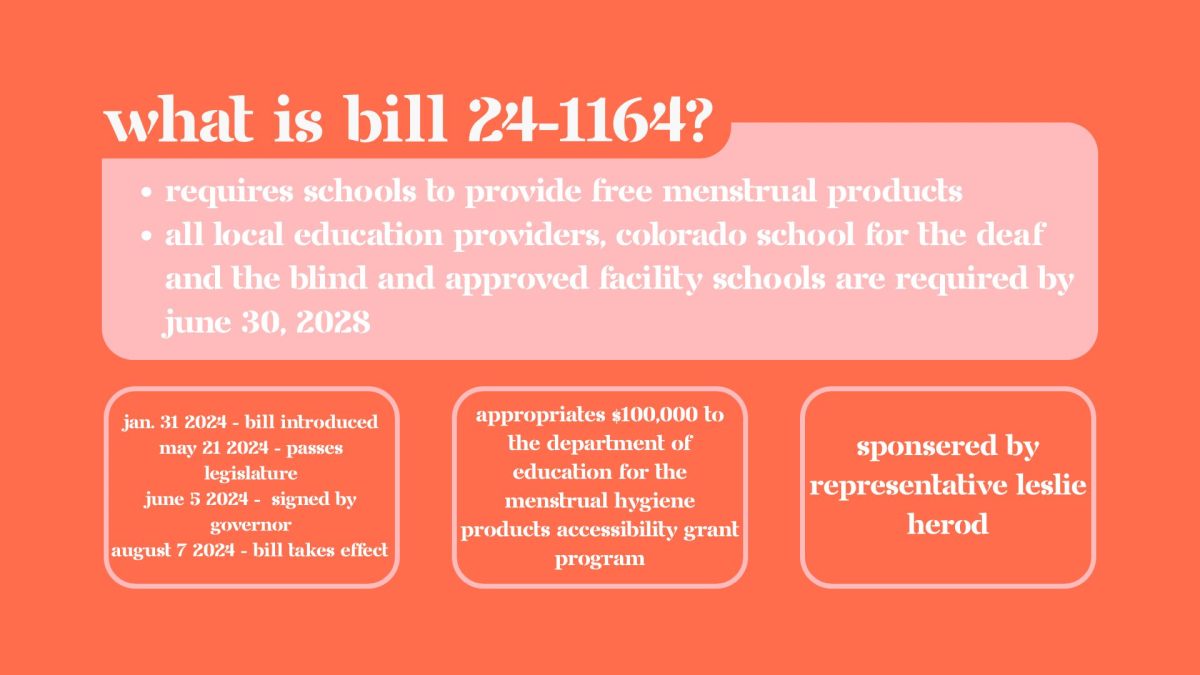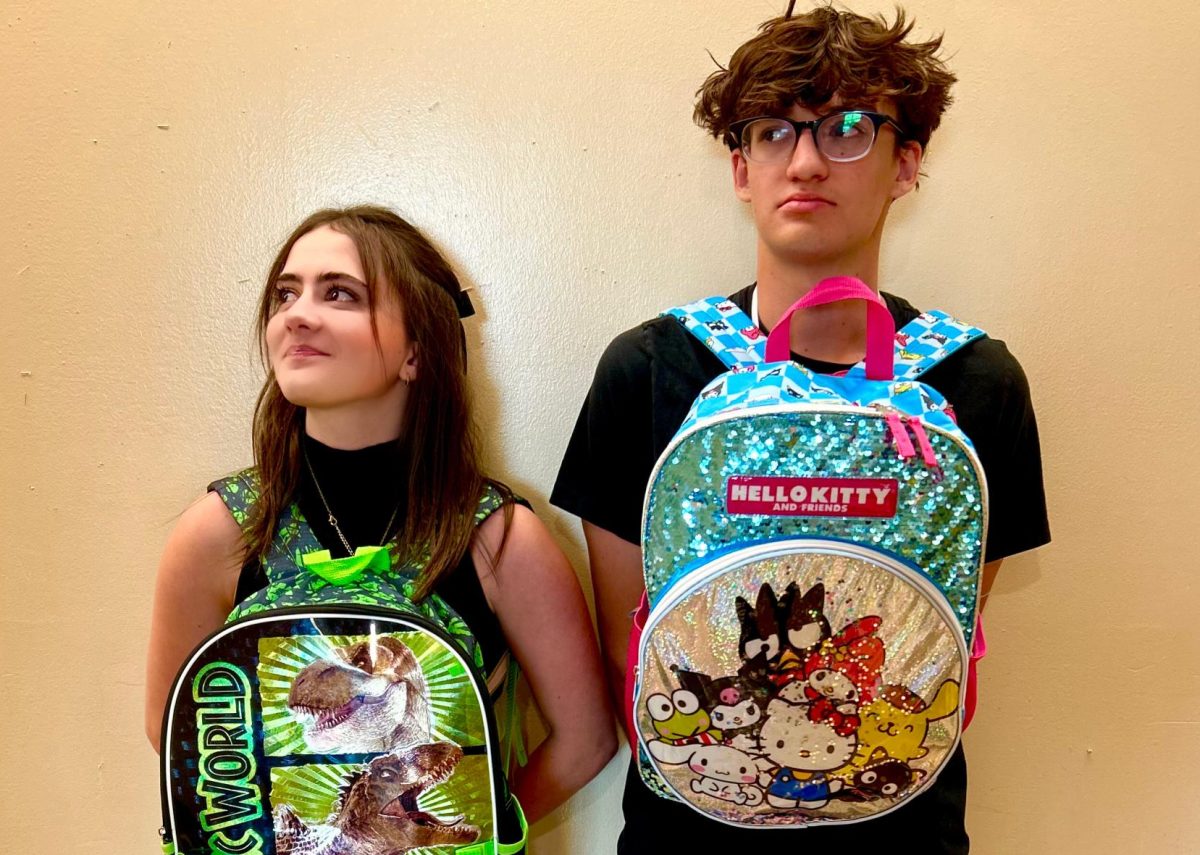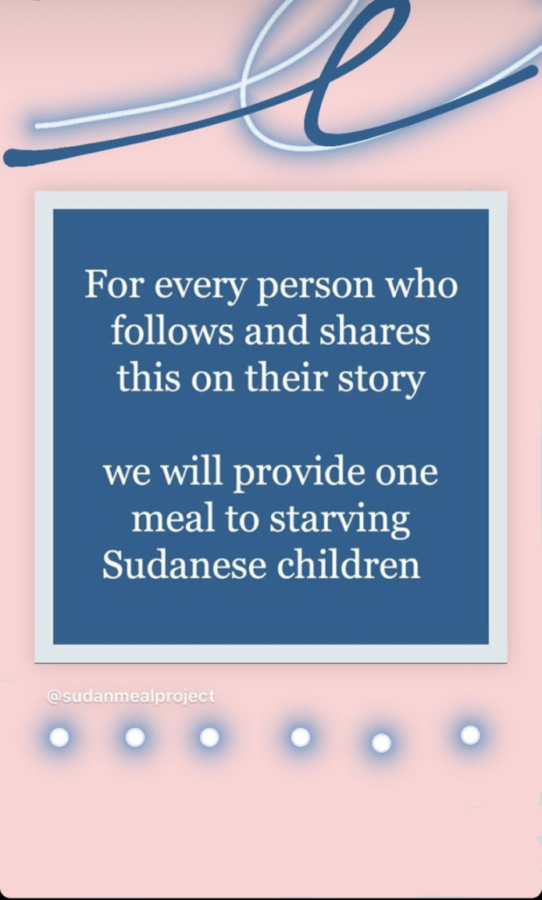Using a Disaster for Likes: How Instagram Accounts Tricked Students into Supporting Their Fake Charities
This week, blue flooded your timeline as protestors, violence and blood flooded the streets of Sudan. Protests from 7,747 miles away became an internet marketing tool, soliciting students’ likes, comments and reposts.
Students decorated their Instagram stories with these posts, believing that they were donating a meal to a Sudanese child in need.

Posts like this one from @sudanmealproject consumed feeds. The posts claimed that for every time someone shared it on their story (reposted), followed the account and commented “DONE,” one meal would be donated to a Sudanese child.
Students like Lauren Mell ‘21 and Lauren Dressler ‘20 followed these instructions.
“I decided to repost the meal post because I thought that it would be a way to help and spread awareness of the situation. I kept seeing people posting it, but I didn’t know if it was a scam,” Mell said. “I decided after a day to repost it.”
Mell determined that the account could not be a scam after looking at the number of likes the post received and the number of followers that account had.
“[The number of likes and followers] made it seem more reliable since the account was getting more popular,” Mell said. Days later, Instagram deactivated the account.
Like Mell, seeing other students’ reposts inspired Dressler to put the post on her story.
“I immediately decided to put it on [my story] too,” Dressler said. “I read through [@sudanmealproject ‘s] post explaining the whole crisis and followed them before reposting.”
After a few days, other accounts like @sudanawarenesshelp, @sudanmealporject_ and @sudanmealproject.x began to appear with similar posts. A swarm of exposé accounts counteracted this wave of new “charity” accounts in support of Sudan. Accounts like @exposinginstascams began to post screenshots of direct messages between the charity accounts and strangers. Within the day, people went from reposting the “meal picture” to reposting these screenshots.
“I don’t think [the students] are in the wrong for posting [the meal picture] because they are just trying to help, however I think they should be a little more careful and fact check the organizations,” Addy Hunter ‘21, who reposted an exposé account, said.
In addition to promoting “charitable” acts, these accounts also circulate statistics about the Sudan crisis. The statistics motivate people to share the posts; resulting in a higher number of shares and more popularity for the account. However, most accounts do not label where the information derives from. The numbers often contradict each other between each account.
“It was honestly disgusting because [the fake charity accounts] were using actual crises for attention and followers while tricking people into thinking they were actually helping the issue,” the account manager for @exposinginstascams said.
The account, @exposinginstascams, works to verify so-called charitable Instagram pages. @exposinginstascams also started a Go Fund Me page for the Sudan crisis, much like the fake accounts. @exposinginstascams relies on their followers to fact check their research, followers can notify them of inaccuracies through the comments section.
To research the fake accounts, @exposinginstascams starts by checking the domain on their email address.
“This can tell me if they have a website.” Then, they check their previous posts.
“This can tell me if they are an actual organization,” @exposinginstascams said. “Next, I check for past usernames to see if they changed their account from something different. Finally, I check their photos on a reverse search engine to see if they are stolen.”
For someone without these resources or the time to do the background research, @exposinginstascams recommends asking simple questions before reposting.
“The best way at this point is to use common sense or even ask a friend for a second opinion,” @exposinginstascams said.
With these accounts, there is little to no way to see who runs them. The (now deactivated) account, @sudanmealproject_, was run by an 18 year-old girl from the United Kingdom, whose friends inspired her to create the account.
“I have a gofundme account set up and was hoping some people will donate,” @sudanmealproject_’s account manager said. “I don’t know how gofundme works.”
The now deactivated gofundme page aimed to raise $10,000 to “donate it straight to Sudan.” The account owner did not have a specific charity for the funds to go to.
“As I said, I need to look into it,” @sudanmealproject_’s manager said. “I’ll donate it to a charity.”
Websites like www.charitynavigator.org and charitywatch.org can verify the credibility of non-profit organizations. This link shows how to report an Instagram account for abuse or spam.
Your donation will support the student journalists of Rock Canyon High School. Your contribution will allow us to purchase equipment, submit to competitions, travel to events and cover our annual website hosting costs.



![Minutes before the Activities Fair in the gym, president Abhi Gowda ‘26 prepares the stall for his club Helping Hands, Sept. 4. A relatively new club, Helping Hands was co-started by Gowda and focuses on assisting the homeless, and just last year they succeeded in raising a couple hundred donations to send to shelters. This year, they have goals to expand, with hopes to increase volunteer opportunities and take in-person trips to shelters, as well as extend their help beyond just homeless people. “The Activities Fair gives a lot of underclassmen the opportunity to really get to know the Canyon culture, and it gives them many opportunities for service and volunteering,” Gowda said. “[Through the Activities Fair,] I hope to find a bunch of new and passionate members about our club and just get our name out there and spread awareness to the cause that we’re fighting for.”](https://rockmediaonline.org/wp-content/uploads/2025/09/1-2-1200x885.jpg)







![The winter guard team makes fifth place at the state championship finals in the Denver Coliseum, March 30. The team performed to Barnes Country's “Glitter and Gold,” lead by coaches Margo Sanford, Blair Bickerton and Anna Orgren. In their class there were a total of nine groups participating, and the top five who made it to finals received a plaque. “[Walking onto the stage] is very nerve-wracking, but also very exciting as well. When you first start color guard there's a lot of anxiety and uncertainty when you first perform in front of an audience, but once you've done it for a while, it starts to become the best part of the season,” Ella West ‘25 said. “It's very fulfilling to see an audience react to something you've put your heart and soul into.”](https://rockmediaonline.org/wp-content/uploads/2025/04/Both-socal-media-nd-website-main-1-1200x846.jpg)


![April marks the 25th anniversary of Sexual Assault Awareness Month, created by the National Sexual Violence Resource Center (NSVRC). This month is to spread awareness of the harassment, assault and abuse that happens around the world. The symbol that represented the month was a teal ribbon; however, some survivors of assault create different symbols and movements like the TikTok trend in 2022, where survivors would tattoo Medusa on their body, in honor of her backstory in Greek Mythology. “I don't think [this month is known] at all. I rarely see anybody talk about it. I rarely see much of an emphasis on posting it online, or much discussion about it, and I feel like there needs to be way more discussion,” an anonymous source said. “I think just validating every experience that a person has gone through, regardless of the degree of it, the severity, is an essential step into making sure that people are aware that this is a very real problem in a society and that we need to do better in addressing it.”](https://rockmediaonline.org/wp-content/uploads/2025/04/IMG_0011-1200x900.jpg)













![Lesbian Visibility Day is April 26, and it’s a holiday to celebrate the lesbian community of the world. Lesbian Visibility day was established in 2008 by many queer activists and organizations who sought to raise more awareness for lesbian history and culture. “So this is why during Lesbian Visibility [Day] we celebrate and center all lesbians, both cis and trans, while also showing solidarity with all LGBTQ+ women and nonbinary people,” Linda Reily, in an article written by her, said.](https://rockmediaonline.org/wp-content/uploads/2025/04/Lesbian-Visibility-day.jpeg)







ExposingInstaScams • Jun 21, 2019 at 9:42 am
This is an amazing article! Very professional and I enjoyed reading it.
Lily Price • Jun 21, 2019 at 9:23 am
I kept seeing these fake posts around Instagram and what they were promising seemed impossible, and later I learned that these were fake as I had previously assumed. People using many different horrible things just to get followers and likes, it absolutely disgusted me!